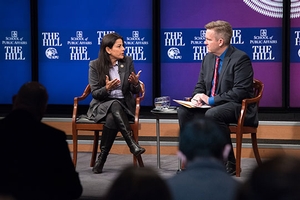Government & Politics
Bipartisan Alliances Critical Say Members of Congress

Three members of Congress recently shared what it takes to reach across the aisle and why it's critical to form bipartisan alliances at an April 11 event organized by the American University School of Public Affairs (SPA), AU's Kennedy Political Union, and The Hill.
The discussion, recently held at the Newseum in Washington, was the second in a series exploring bipartisanship. The first, held on the American University campus, featured Rep. Adriano Espaillat (D-NY), Rep. Mia Love (R-UT), and Rep. Darren Soto (D-FL). Both events were moderated by The Hill's Editor in Chief, Bob Cusack.
Although today's political environment often focuses on the deep divisions in politics, SPA Dean Vicky Wilkins said the gathering was "a chance to highlight the good that's being done."
"Achieving bipartisanship is tougher than it should be but not impossible if you are determined and listen to the other side," said U.S. Senator Lamar Alexander (R-TN). "In the Senate, the only way to accomplish something is by working across party lines because you have to have 60 votes. Bipartisanship is not my goal. Getting results is. And that requires relationships and trust."
Alexander explained that, too often, each side "digs in" on a perspective instead of looking at the greater good of working together.
During the event, Rep. Nanette Barragan (D-CA) said that, although her district is overwhelmingly Democratic, her constituents care about jobs and health care more than political posturing. This means she must work cooperatively with the lawmakers in both parties to accomplish goals.
New to the House this term, Barragan was co-president of the freshman class and helped coordinate social events where politicians could get to know one another. The events provide a setting to have conversations that can lead to co-sponsoring a bill.
"There are areas where there is bipartisanship," said Barragan. "You stand by your issues and your values, but you find people with common ground to work on something."
While interviewing Rep. Steny Hoyer (D-MD), Cusack mentioned how, for years, Hoyer has been highly regarded in the polls by Republican lawmakers as someone they enjoy working with, despite sometimes disagreeing with him.
"The Congress is less than the sum of its parts. There are good people on both sides, but when we get together we're not working very well," said Hoyer. "I work at trying to give everybody in the House respect. If you respect people, they return that respect."
Hoyer said that despite the good relationships, as constituents have become more polarized, so too have their elected leaders.
Alexander also said he believed partisanship has gotten worse. He pointed to technology as a factor.
"What changed is this," he said holding up his smart phone. "We live in an internet democracy and the Congress reflects the fractures in the country."

